MA in Publishing
MA in Publishing

Posted by clh238
22 April 2025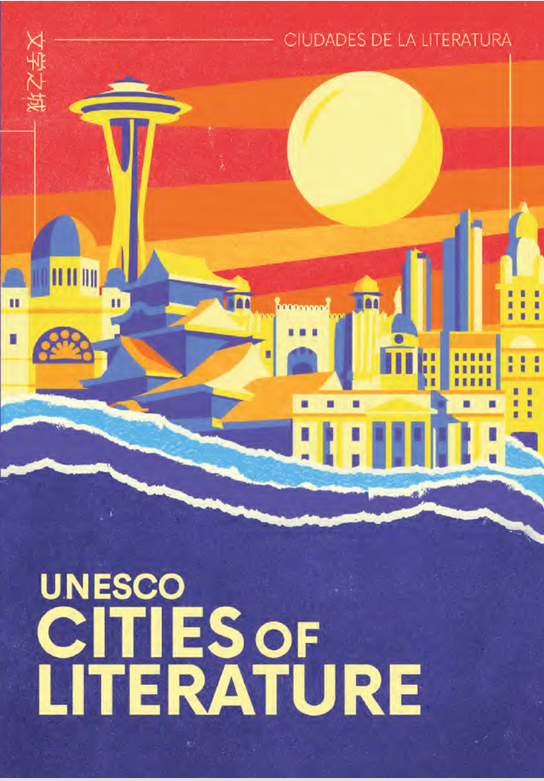
Transnational Networking
The importance of community and transnational networks is a thread that runs through our student-led publication, UNESCO Cities of Literature. Throughout my second term as a Publishing MA student, my cohort have been promoting our publication and organising launches to celebrate the book’s release. My role within this process has centred on global outreach and, as a result, I decided to reach out to universities within the Cities of Literature network that offer postgraduate degrees in the field of publishing.
It was through this outreach that I met Ben Schapira, a student undertaking the University of Milan’s ‘Master in Editoria’, which is the equivalent of Exeter’s Publishing MA and organised in collaboration with Fondazione Mondadori and the Italian Publishers Association. Meeting Ben and comparing our respective degrees has been incredibly illuminating. Through our discussion, structured as five questions we each answered, we explored the different ways our courses prepare us for work within the publishing industry.

Why did you apply for your master’s degree in publishing?
Chloe: After completing my BA in English Literature at the University of Exeter, I initially wanted to teach abroad in China because it would give me the opportunity to travel and improve my Mandarin, which is now very rusty! However, whilst working as a Teaching Assistant in London, I was given the opportunity to run the school library, which made me rethink my plans. I loved curating the displays for the students, and receiving access to the database of books gave me an insight into the ‘behind-the-scenes’ aspect of the literary field. I had always been an avid reader, and publishing was an area that interested me greatly, so I decided to apply for the Publishing MA at the University of Exeter. Because the publishing industry is very difficult to enter, any qualifications that I could obtain, and any networks that I could cultivate, would stand me in good stead for future job opportunities.
Ben: Like many others drawn to this field, the fundamental reason I undertook a master’s in publishing is that I love books and have always loved them. They shaped my childhood, adulthood, and understanding of the world. They became a reference point—a fixed element of stability that has guided me since I was six years old and my grandmother would read me Pinocchio before bed. (Although it terrified me so much that we never did end up finishing it.)
Semi-biographical considerations aside, once I understood I wanted to work with books, I knew I had to learn all I could about what goes into making and selling them. Our program, Master in Editoria, seemed to be the most promising solution. The degree lasts a year and is split in half between 500 classroom hours, taught by professionals working in the field, and an internship lasting 480 hours. This approach serves two functions: it gives you direct practical knowledge of the publishing world’s inner workings and allows you to connect with professionals who have already established themselves in the industry. To me, this sounded ideal; what better way to learn their trade secrets?
How does your master’s work, and how is it preparing you for the industry?
Chloe: There are around twenty students studying the Publishing MA at the University of Exeter. The course is divided into three terms and comprised of five modules totalling 180 credits. Two modules – ‘Editorial Processes and Practices’ and ‘The Global Publishing Marketplace’ – are compulsory, and they provide students with academic and practical knowledge of the publishing industry.
During my first term, my student cohort worked together to produce an anthology of articles, reviews, interviews, and fiction pieces, titled UNESCO Cities of Literature. Because this publication was entirely student-led, we learned how to edit each other’s work and communicate feedback with authors. Alongside this, I took an optional module titled ‘Publishing and Power’, which explored the impact of Black and South Asian literary networks within the UK. These two modules demonstrated the importance of collaboration and connections within this industry.
Throughout my second term, our cohort advertised our book, which culminated in two launches: one online and one in-person. The launches were a great success; they showcased the hard work put in by my cohort, and I’m really proud of what we have achieved. Ultimately, Exeter’s Publishing MA balances academic and practical learning to instil its students with the knowledge and confidence they need to thrive within the industry.
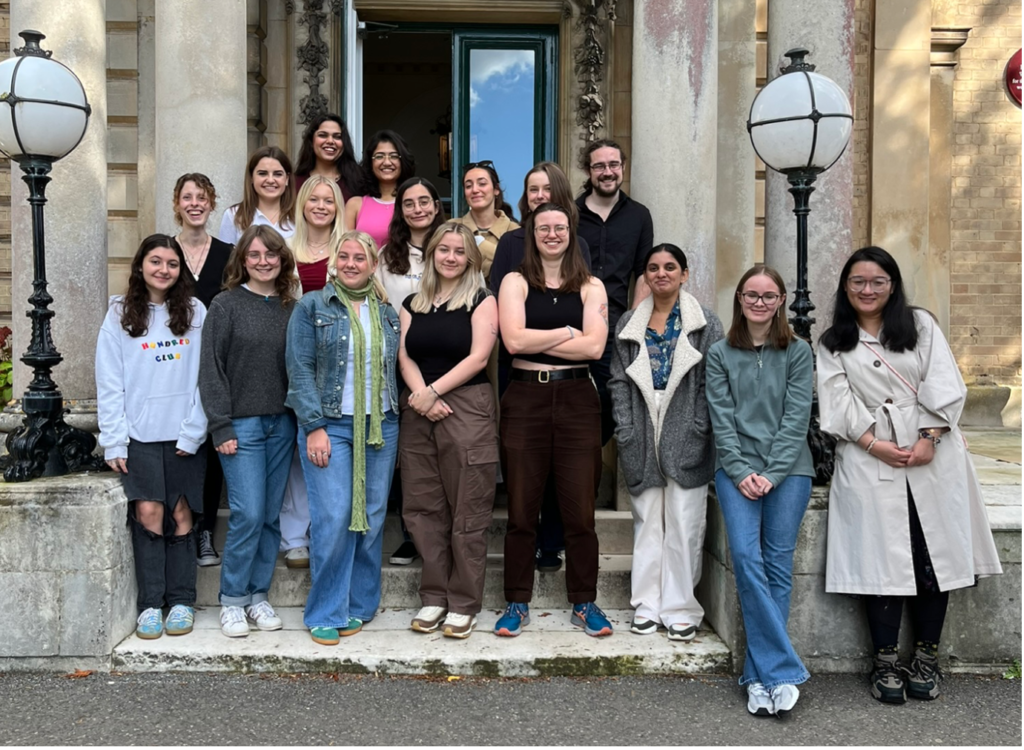
The University of Exeter’s 2024-25 Publishing Cohort. Image taken from the MA Publishing website
Ben: As mentioned above, our program lasts a year and is split into lessons and an internship. We are fast approaching the end of our time in the classroom (May 23rd is our last day), after which we will begin our internships, which could start during the summer or, at the latest, in September.
The program is open to 26 people selected through a series of tests concerning the history of Italian publishing, current and past market trends, the structure and roles within a publishing house, proofreading, and an open-ended response on a literary trend. This year’s question concerned the phenomenon of retelling, which I could only answer because the internet had made me painfully aware of the Fifty Shades of Grey remake, Grey: Fifty Shades of Grey as Told by Christian.
Our modules focus on several key areas that reflect the realities of today’s industry. These include editorial fundamentals and the history of publishing, editorial practice and production workflows (such as editing, proofreading, translation, and layout with InDesign), traditional and digital marketing, and communication. We also explored the legal and business aspects of the industry, covering contracts, copyright, distribution, and budgeting, and gained valuable insight into global markets and cultural trends. Frequent guest lectures, workshops with professionals, and site visits to publishers, book fairs, and bookstores have grounded our learning in the real dynamics of the field.
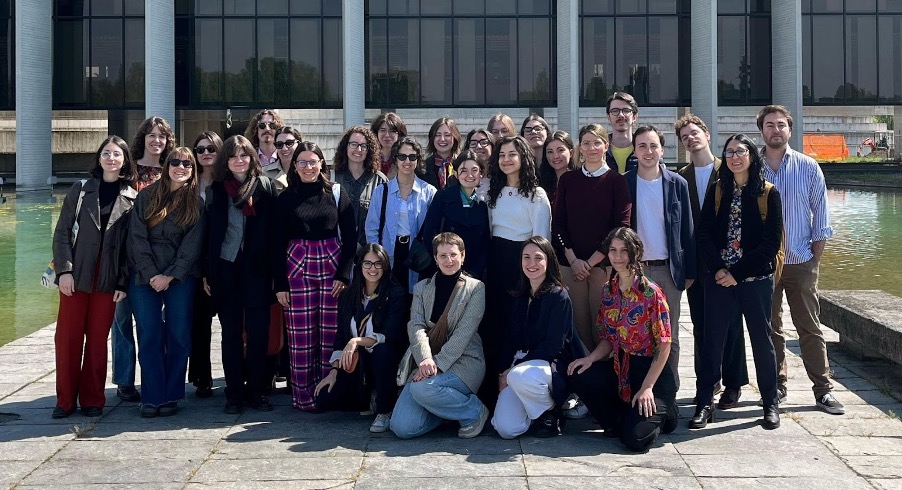
Master in Editoria’s 2024-25 Class. Photo taken by S. Zanotto during a visit to Gruppo Mondadori’s HQ.
What is the most important thing that you have learned?
Chloe: I am grateful that Exeter’s Publishing MA highlights both the breadth and depth of each role in the publishing sector. The two core modules are taught collaboratively, and industry professionals – ranging from editors and translators to rights consultants and literary agents – kindly gave up their time to talk to us about their positions. Personally, I found learning about professional editors to be invaluable. Before beginning this master’s degree, I had some editorial experience, but I did not fully appreciate how nuanced and time-consuming the process can be. However, our cohort was lucky enough to have three workshops, with professional editors Vimbai Shire and Em Mercer, where we learned how to approach structural edits, copyedits, and proofreads of given texts. Not only have these workshops given me confidence in my abilities and editorial judgement, but I have subsequently used these techniques to edit my own essays, with great success! I now know that editorial work is something I greatly enjoy and am keen to pursue.
Ben: Two things: the importance of collaboration and networking!
We call the sum of the businesses and processes that make up the publishing world in Italy “la filiera editoriale,” meaning the supply chain that connects everyone involved from authors and literary agents, to editors, translators, designers, printers, distributors, booksellers, and finally, readers. Having worked with a small-scale publishing house before (more of a one-person operation, I have to be honest), I had not realized how collaborative the entire process truly is. Publishing is the culmination of a collective effort that involves constant communication, negotiation, and teamwork.
Which brings us to the second important concept I learned from the program, networking. Because the Italian publishing world is compact and closely-knit, deeply interconnected by professional relationships, knowing the people who make up this industry is essential for entry, growth, and professional success. Whether attending book fairs, literary events, launches, or prize ceremonies, you continuously encounter familiar faces who move within different roles and publishing houses. Forming relationships becomes an essential part of the life of an Italian working in the business.
What has been the best part of your experience so far?
Chloe: Without a doubt, the best part of this degree was attending the 2025 London Book Fair. My cohort spent two days at the fair, where we could attend talks, network with people, and discover the intricacies of the industry. Admittedly, I found the first day very overwhelming, which is perhaps unsurprising considering that there were roughly 30,000 attendees across three days! However, after the initial shock I enjoyed exploring the stalls and talking to people at their stalls. On day two, I attended several talks given by English PEN, including one titled, ‘What do we do with Contentious Classics?’. I really appreciated English PEN’s talks because they embraced difficult yet essential conversations, and I left day two feeling incredibly stimulated. I also loved this trip because it gave me a chance to bond with my cohort. The master’s degree can get quite overwhelming but being in London gave us all a chance to enjoy ourselves without the stress of deadlines!
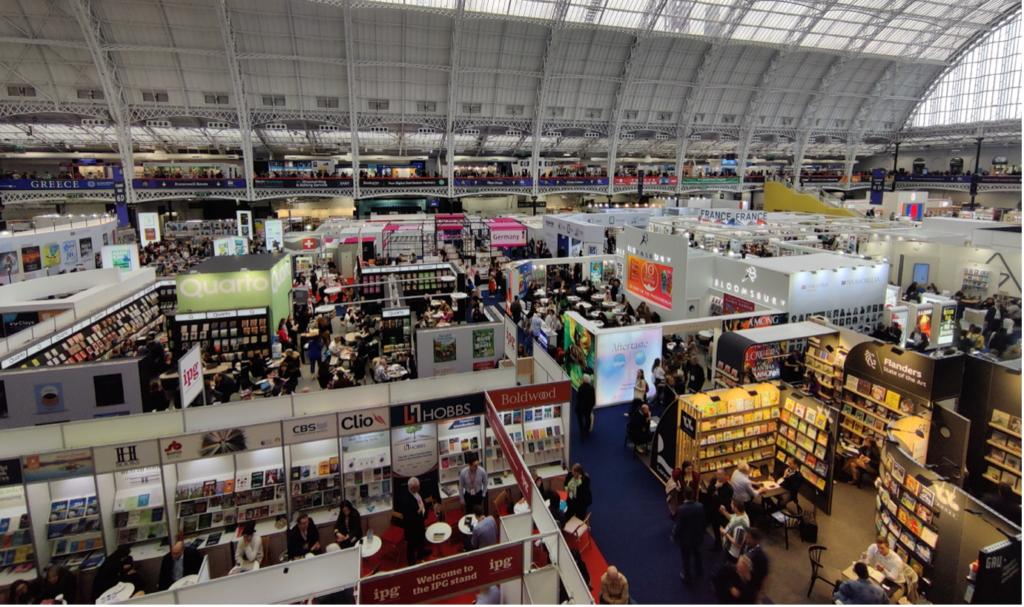
The 2025 London Book Fair. Image captured by author.
Ben: Without a doubt, attending the Bologna Children’s Book Fair. Seeing so many publishing houses coexist within the same vibrant, colourful space was an awe-inspiring experience, although overwhelming at times. It allowed me to observe the direct diversity between publishers: their different editorial lines, aesthetic choices, and how they cater to their audiences. Because children’s literature publishers rely so heavily on design to attract readers, they produce wondrous books that blend meticulous illustrations, innovative formats, and creative storytelling techniques into beautifully crafted works. It felt inspiring to walk among the fair’s aisles, although I did also feel some envy towards the people who can create such amazing things.
Here are a few Italian publishers that caught my eye and might catch yours, too: Ippocampo, Terre di Mezzo, Carthusia, Il Castoro, Babalibri, Topipittori, and Pelledoca.
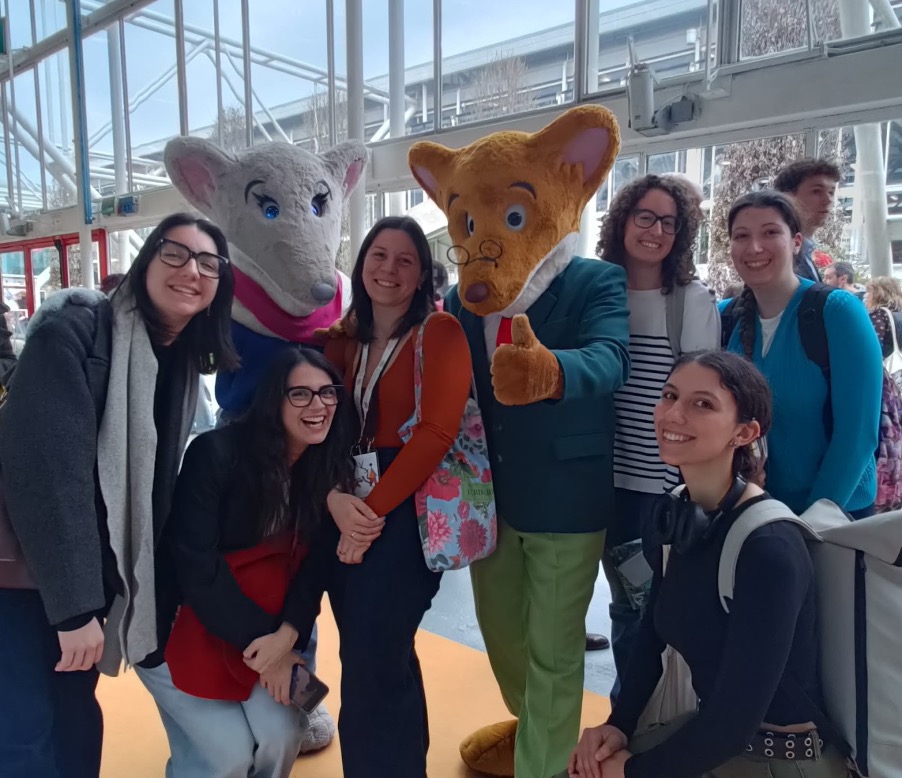
Some of us at the 2025 Bologna Children’s Book Fair with Geronimo and Tea Stilton. Photo taken by A. Anzani.
How do you plan on using the knowledge you have gained in the future?
Chloe: After completing Exeter’s MA Publishing programme, I feel as though I can confidently enter the publishing workplace. I began my degree unsure of what aspects of publishing I wished to pursue, but the many lectures given by industry professionals throughout terms one and two provided me with invaluable insight that helped me choose a career path. I am so glad I chose to pursue this qualification; this has been one of the most informative, stimulating, and rewarding experiences of my life.
Ben: I hope to use this knowledge to begin my career as soon as possible. I see my time in the classroom and the upcoming internship as the start of a lifelong journey—the foundation on which I’ll continue building my skills as an editor. This (un)fortunately means I still have a great deal to learn, but I’m genuinely excited for that growth and eager to learn as much as I can from the professionals I’ll have the chance to work with.
This blog is an example of how the UNESCO Cities of Literature network encourages transnational connections and collaborative opportunities. Working with Ben has been incredibly rewarding and has given us both insight into each other’s university experience. The University of Exeter and the University of Milan both provide their students with the information and experience necessary to work within the publishing industry, and the differences between our MA programmes could offer new perspectives on the structure of our respective courses. Exeter and Milan are both Cities of Literature, and their universities make use of the connections within this network. These transnational relationships laid the foundations for my work with Ben. I am excited for future collaborations between Ben and myself, and hopefully between our MA courses.

Ben Schapira is a student in the 2024–2025 edition of the Master in Editoria program. He previously earned a BA in Journalism and Media Communication from Colorado State University.
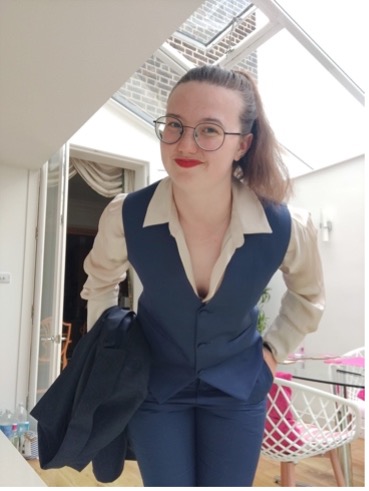
Chloe Hatch is a student pursuing an MA in Publishing at the University of Exeter, which is also where she completed her BA in English Literature.